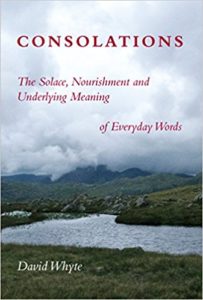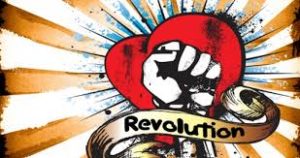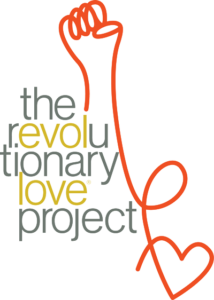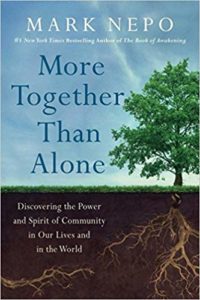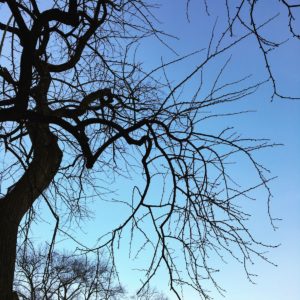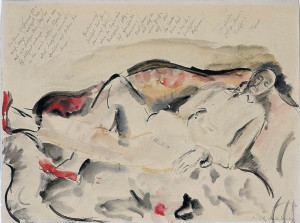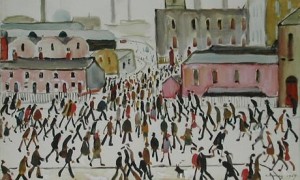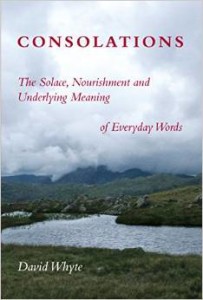words
Ketchum Idaho’s Community Library
December 30, 2020Knitting Yarns and Years
|
|
|
Revolutionary ❤
July 28, 2018David Whyte
Heartbreak is unpreventable; the natural outcome of caring for people and things over which we have no control
Heartbreak begins the moment we are asked to let go but cannot, in other words, it colors and inhabits and magnifies each and every day; heartbreak is not a visitation, but a path that human beings follow through even the most average life. Heartbreak is an indication of our sincerity: in a love relationship, in a life’s work, in trying to learn a musical instrument, in the attempt to shape a better more generous self. Heartbreak is the beautifully helpless side of love and affection and is [an] essence and emblem of care… Heartbreak has its own way of inhabiting time and its own beautiful and trying patience in coming and going.
Maria Popova:
“Words belong to each other,” Virginia Woolf asserted in the only surviving recording of her voice. But words also belong to us, as much as we belong to them — and out of that mutual belonging arises our most fundamental understanding of the world, as well as the inescapable misunderstandings that bedevil the grand sensemaking experiment we call life.
David Whyte:
Heartbreak is how we mature; yet we use the word heartbreak as if it only occurs when things have gone wrong: an unrequited love, a shattered dream… But heartbreak may be the very essence of being human, of being on the journey from here to there, and of coming to care deeply for what we find along the way.
[…]
There is almost no path a human being can follow that does not lead to heartbreak.
Then, p. 113-115 in Consolations:
Hiding is a way of staying alive. Hiding is a way of holding ourselves until we are ready to come into the light. Hiding is one of the brilliant and virtuoso practices of almost every part of the natural world: the protective quiet of an icy northern landscape, the held bud of a future summer rose, the snowbound internal pulse of the hibernating bear. Hiding is underestimated. We are hidden by life in our mother’s womb until we grow and ready ourselves for our first appearance in the lighted world; to appear to early in that world is to find ourselves with the immediate necessity for outside intensive care.
Hiding is an act of freedom from the misunderstanding of others, especially in the enclosing world of oppressive secret government and private entities, attempting to name us, to anticipate us, to leave us with no place to hide and grow in ways unmanaged by a creeping necessity for absolution naming, absolute tracking and absolute control. Hiding is a bid for independence from others, from mistaken ideas we have about ourselves, from an oppressive and mistaken wish to keep us completely safe, completely ministered to,and therefor completely managed. Hiding is creative, necessary and beautifully submerse of outside interference and control. Hiding leaves life to itself Hiding is the radical independence necessary four our emergence into the light of a proper human future.
Parker Palmer
p. 161:
Suffering breaks our hearts, but the heart can break in two quite different ways. There’s the brittle heart that breaks into shards, shattering the one who suffers as it explodes, and sometimes taking others down when it’s thrown like a grenade at the ostensible source of its pain. Then there’s the supple heart, the one that breaks open, not apart, the one that can grow into great capacity for the many forms of love. Only the supple heart can hold suffering in a way that opens to new life.
p.39:
We both know that everyone has inner wisdom, and that one of the best ways to evoke it is in dialogue.
p. 161
Does a nation-state have a heart that can become supple enough to respond to collective suffering without violence?[…] I am not going to yield to cynicism. There are enough real-world facts and possibilities to justify hope.
p. 172
Pay attention to what’s right here, right now, and you’ll be rewarded immediately–the Beloved Community is in our midst.
pp. 117-188
Keep reaching out means saying to the world, “I’m still a member of this community. I have a voice and things I need to say, and I want to be part of the conversation.” Seeking Sanctuary is about finding the solace and support we need when our engagement with the rough-and-tumble world of politics starts to cost us our physical and mental well-being. I’m a Quaker. I stand in a religious tradition that asks me to live by such values as community, equality, simplicity, and nonviolence.
Recognize manipulations of
F
E
A
R
“Violence is what happens when we don’t know what to do with our suffering.” [Palmer]
Valarie Kaur is a civil rights activist whose personal lens is colored through feminism and inspired by the Sikh concept of the warrior-saint.
p. 157:
Valarie is redefining and reviving the great tradition of nonviolent action in terms that respond to what Martin Luther kIng Jr. called “The fierce urgency of now.”
Quoting Thomas Merton:
“Loving God is a piece of cake compared to loving another human being. Being human is harder than being holy.”
Revolutionary Love
Declaration of Revolutionary Love:
We declare love even for our opponents. We vow to oppose all executive orders and policies that threaten the rights and dignity of any person. We call upon our elected officials to join us, and we are prepared to engage in moral resistance throughout this administration. We will fight not with violence or vitriol, but by challenging the cultures and institutions that promote hate. In so doing, we will challenge our opponents through the ethic of love.
Thich Nhat Hanh
Enlightenment for a wave is the moment the wave realizes that it is water. At that moment, all fear of death disappears.
Profoundly, grace comes to the wave when it realizes what it is made of. Since it has risen from the very same water into which it will crash its fear of ending is somehow lessened. For it is already a part of where it is going. Can it be that you and I, like simple waves experience such an enlightenment the instant we realize that we are all made of the same water? […] I think now that the other way to read all t his is to say that enlightenment is the moment we realize that we are made of love. At that moment, all fear of living disappears. For grace comes to the heart when it realizes what it is made of and what it has risen from.
-Mark Nepo, The Book Of Awakening
“The ‘Go away’ tribe believes that human beings by nature are self-serving and untrustworthy, in need of control. The ‘Go away’ tribe believes in stringent laws and constraints, both moral and legal, to ensure that people don’t run amok. The ‘Come, teach me’ tribe believes that human beings by nature are kind and trustworthy. The ‘Come, teach’ tribe believes in cultivating laws that empower freedom, to ensure that people actualize their gifts through relationship.
While Mark was a perceptive diagnostician of the modern world, offering insights into the human cost of industrialization. Marx foresaw that capitalism and industrialization break people from their true nature. In time, the modern world alienates from our true selves, which leads to fear and the strident calls of the “Go away’ tribe. Regardless of the type of government we support, there is always the need to repair that brokenness and to restore us to our true nature–from which we rediscover, one more time, that we are more together than alone.”
What we see across the devoid is us. We have created the systems we suffer under.”
Walter Starke
I realized that the spiritualization of our nation’s corporations is the most important development that can possibly happen for the spiritual growth of the the world as a whole.
Le Guin
January 25, 2018Words that resonate.
February 20, 2017‘Our worldview casts a shadow in the words that resonate.
One reason it’s difficult to understand each other is that behind the words we use are the worldviews, the emotions and the beliefs we have before we even consider what’s being said.
Before we get to right and wrong, good or bad, effective or ineffective, we begin with worldview.
They affect the way we choose a car, engage in a conversation or vote. These cultural and learned worldviews alter the way we see and hear and speak.
Words like: Fairness, change, interference, freedom, responsibility and opportunity trigger different reactions based on worldview. It’s always easier to encourage action based on an existing worldview than it is to change that view.
The columns below don’t line up for everyone (or anyone), but instead highlight different instincts on different axes on how each of us see the world in any given moment…
| An all-powerful authority | Treat others as you’d want to be treated |
| Confidence, results, right now, right later |
Exploration, truth, working toward perfect, always a little wrong |
| Self-respect, power, agency, taking space |
Role awareness, dignity, giving space, flexibility |
| Deserve, entitled, keep | Share, distribute, invest |
| Effects | Side effects |
| Ends and means | Means and ends |
| Getting things done | Listening, speaking up and being heard |
| Patriotism, nationalism, the homeland |
Community, ecology, the system |
| Power, authority, compliance, respect, status | Fairness, hope, justice, connection, healing |
| Profit-seeking | Public utility |
| Intuitive | Informed |
| Realism, denial | Optimism, pessimism |
| Rewards, incentives, victory, spoils |
Equity, fairness and the alleviation of suffering |
| Urgency, triumph, security, impulse |
Self control, long-term thinking, wisdom |
| Vengeance | Forgiveness |
| Zero-sum | Win-win |
Once we understand the landscape that someone sees, we have an easier time using words and images to fill in that landscape, to create a story that they can hear and understand, and, perhaps, we can make change happen.’
-Seth Godin
Language.
December 11, 2016‘…at one with the earth.’
November 4, 2016Once for each thing. Just once; no more.
And we too, just once. And never again.
But to have been this once, completely,
even if only once: to have been
at one with the earth,
seems beyond undoing.
-Rainer Maria Rilke
I enter every meeting with another being saying to myself, ‘If I only have this time on Earth with this person, if I may never see them again, what is it I want or need to ask, to know? What is it I want or need to say?’ Honoring others in this way has opened me to wisdoms that would otherwise run silent beneath my time on Earth.
-Mark Nepo
Words matter.
March 13, 2016The Guardian
Neoliberalism has hijacked our vocabulary.
Instead of an unrelenting quest for growth, might we not ask the question, in the end: “What is an economy for?”, “What do we want it to provide?”
Our current imaginings endow the market and its associated forms with a special status. We think of “the economy” in terms of natural forces, into which we occasionally intervene, rather than in terms of a whole variety of social relations that need some kind of co-ordination.
[…]
Above all, we need to bring economic vocabulary back into political contention, and to question the very way we think about the economy in the first place. For something new to be imagined, let alone to be born, our current economic “common sense” needs to be challenged root and branch.
http://www.theguardian.com/commentisfree/2013/jun/11/neoliberalism-hijacked-vocabulary
Consolations, by David Whyte
April 30, 2015“Words belong to each other,” Virginia Woolf asserted in the only surviving recording of her voice. But words also belong to us, as much as we belong to them — and out of that mutual belonging arises our most fundamental understanding of the world, as well as the inescapable misunderstandings that bedevil the grand sensemaking experiment we call life. (Friendship, love, and heartbreak.)


